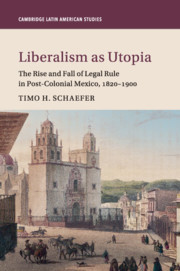Description
Liberalism as Utopia
The Rise and Fall of Legal Rule in Post-Colonial Mexico, 1820–1900
Cambridge Latin American Studies Series
Author: Schaefer Timo H.
This book explores the legal culture of nineteenth-century Mexico and explains why liberal institutions flourished in some social settings but not others.
Language: English
Subject for Liberalism as Utopia:
Approximative price 32.87 €
In Print (Delivery period: 14 days).
Add to cart
Liberalism as Utopia
Publication date: 02-2019
Support: Print on demand
Publication date: 02-2019
Support: Print on demand
Approximative price 114.03 €
In Print (Delivery period: 14 days).
Add to cart
Liberalism as Utopia
Publication date: 08-2017
Support: Print on demand
Publication date: 08-2017
Support: Print on demand
Description
/li>Contents
/li>Biography
/li>
Liberalism as Utopia challenges widespread perceptions about the weakness of Mexico's nineteenth-century state. Schaefer argues that after the War of Independence non-elite Mexicans - peasants, day laborers, artisans, local merchants - pioneered an egalitarian form of legal rule by serving in the town governments and civic militias that became the local faces of the state's coercive authority. These institutions were effective because they embodied patriarchal norms of labor and care for the family that were premised on the legal equality of male, adult citizens. The book also examines the emergence of new, illiberal norms that challenged and at the end of the century, during the dictatorship of Porfirio Díaz, overwhelmed the egalitarianism of the early-republican period. By comparing the legal cultures of agricultural estates, mestizo towns and indigenous towns, Liberalism as Utopia also proposes a new way of understanding the social foundations of liberal and authoritarian pathways to state formation in the nineteenth-century world.
Introduction; 1. Mestizo towns; 2. Family and legal order; 3. Haciendas; 4. Indigenous towns; 5. Dictatorship; Conclusion: law and exception in the making of modern Mexico.
Timo H. Schaefer received his Ph.D. in History from Indiana University. Between 2015 and 2017 he was a postdoctoral fellow at the University of British Columbia.
© 2024 LAVOISIER S.A.S.



